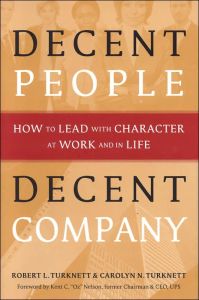Join getAbstract to access the summary!

Join getAbstract to access the summary!
Robert L. Turknett and Carolyn N. Turknett
Decent People, Decent Company
How to Lead with Character at Work and in Life
Davies-Black Publishing, 2005
What's inside?
Real leaders take personal responsibility, respect others and lead with genuine integrity.
Recommendation
Robert L. Turknett and Carolyn N. Turknett wrote this book before the corporate scandals of Enron, Tyco and WorldCom, so their emphasis on integrity as a crucial component of leadership is prescient. They believe in emotional and life balance rather than ambition, and cooperation rather than competition. Every chapter is full of examples of people who have taken leadership roles based on these values, showing that it is, in fact, possible. getAbstract recommends this book to leaders and aspiring leaders – whether of organizations, companies, departments, or even social or family groups – who wish to find out how they, as individuals, can lead with integrity. Leaders who truly believe in what they are doing and the people they are leading will embrace the challenge of further developing themselves using this leadership character model.
Summary
About the Authors
Robert L. Turknett and Carolyn N. Turknett co-founded a consulting organization that works with CEOs, executives and leaders of large organizations.

















Comment on this summary